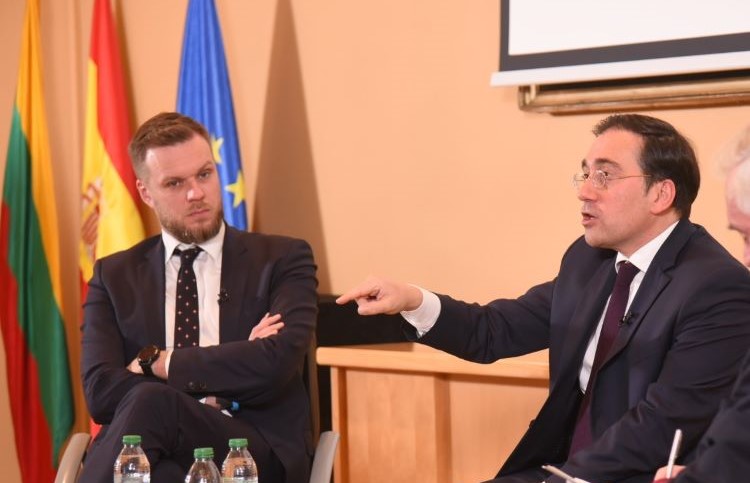Eduardo González
The Minister of Foreign Affairs, José Manuel Albares, received yesterday in Madrid his Lithuanian counterpart, Gabrielius Lansbergis, with whom he signed an agreement on bilateral political consultations and to whom he reiterated Spain’s commitment to the security of NATO’s Eastern Flank.
Lansbergis yesterday returned the visit paid last April by Albares to Vilnius, all within the framework of the commemorations for the centenary of the establishment of diplomatic relations between Spain and Lithuania, which took place in July 1922. In fact, after their first meeting yesterday, the two ministers took part in the inauguration of an exhibition, expressly dedicated to the centenary, of original documents relating to the history of relations between the two countries.
“To strengthen and update our ties, we have signed today (yesterday) a political consultation agreement that will structure our relationship in different areas, such as security and defense, key dossiers for the EU and the exchange of views on a global scale on different regions of the world, especially Latin America,” explained Albares during the press conference following the meeting.
The two ministers also discussed economic and trade relations. “Last year, the trade balance reached a record 909 million euros and this year the figures indicate a strong growth, but we have been analyzing that there is still capacity to continue increasing and improving and that is why we are going to explore opportunities to increase these relations in strategic areas such as renewable energies, defense or infrastructures“, continued the Spanish minister.
As for security and defense, according to Albares, the two countries are “firmly committed to what was agreed at the Madrid Summit (of NATO) to find the best way to support the Ukrainian people in their struggle for their freedom, for their territorial integrity and for their sovereignty and also in the appropriate measures to increase the resistance of those who suffer unjustly from Russian pressure, such as Moldova or Georgia”. “We will continue to work on these issues in view of the next NATO Summit, which will be held precisely in Vilnius next year,” he assured.
Albares also reiterated Spain’s “commitment” to the security of Lithuania, because it is also our security, as well as to the security of the entire Baltic region. “Spain contributes to the security of NATO’s eastern flank through its permanent presence in the enhanced Forward Presence (eFP) in Latvia and by rotating in the Baltic Air Police in Lithuania and Estonia,” he recalled. “Lithuania can continue to count on our commitment to keep contributing as much as necessary,” he insisted.
Gabrielius Lansbergis
For his part, Gabrielius Lansbergis called it “very important” that the NATO Summit “moves from Madrid to Vilnius, thus connecting the south and the north in order to have a good understanding of security issues.” “Spain and Lithuania are border countries and we, as Europe, need a common approach to security,” he stated. “The Eastern Flank and the southern neighborhood are complementary, not conflicting, aspects of the overall European policy, because problems occurring on one border have repercussions throughout Europe,” he warned. For this reason, the Lithuanian minister said he was “very grateful to Spain for playing a very important role in the security of the region, especially for participating in the NATO Baltic Air Police and the Reinforced Forward Presence in Latvia”.
The two ministers later participated in an academic discussion entitled Looking to the East without losing the South. The shared threats and challenges facing Spain and Lithuania in a new European geopolitical scenario, organized by the Elcano Royal Institute. During the event, Albares reiterated the need to “continue helping Ukraine to fight for its sovereignty, freedom and democracy, providing them with military material and humanitarian aid”, and affirmed that, when the war is over, “Russia will still be there and the relationship with Moscow will have to be rethought”. For his part, Landsbergis praised “how much Spain is doing to help Ukraine”, which “has shown that geographical distance is not the main factor”.
Gabrielius Landsbergis’ official visit to Spain, which began last Sunday and will end today, includes a meeting with Spanish business representatives, to whom he will present bilateral economic cooperation and investment opportunities and his country’s interest in strengthening economic cooperation with Spain in areas of high technology and reconstruction projects in Ukraine, according to the Lithuanian Ministry of Foreign Affairs.







